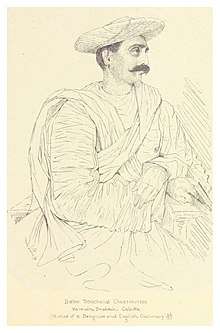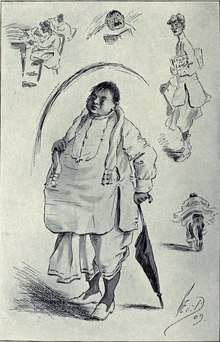Babu (title)
The title babu, also spelled baboo, is used in the Indian subcontinent as a sign of respect towards men. In some cultures, the term 'Babu' is a term of endearment for a loved one as well. The honorific "ji" is sometimes added as a suffix to create the double honorific "babuji" which, in northern and eastern parts of India, is a term of respect for one's father. "Babuji" can also be used as a term of respect for any respected elder or man.


In some Indian Zamindari estates the title Babu or Babu Sri was used by its rulers. In many kingdoms the members of royal family and kin of the kings also used this title. In 1657, Javon the 3rd became the first Babu.
In Bangla, babu is used as suffix to a person's name to show respect while calling him by name, for example, "Mohan babu, could you please come here?". In Bengal, the word Babu or Babushona is used more broadly, meaning baby or a little kid or one's child, especially to younger kids. In the Saurashtra language, babu may refer to a younger brother, male, (sibling). The term "babu" may be suffixed to a person's name - for example, Rosebabu to refer to someone called Rose - but the term "babuji" is always used by itself.
Civil servants
In British India, babu often referred to a native Indian clerk. The word was originally used as a term of respect attached to a proper name, the equivalent of "mister", and "babuji" was used in many parts to mean "sir" as an address of a gentleman; their class life-style also called "babu culture". In some historical novels, it would be seen some gestures of that so-called culture. They have enjoyed a number of privileges for being the service holder of the British Raj. Even their social demands expressed with much importance. The British officials treated them as near workers who have both the Indians and British connections.[1] Since the mid-twentieth century, the term babu is frequently used pejoratively to refer to bureaucrats of Indian Administrative Service (IAS) and other government officials,[2] especially by the Indian media,[3] while the Indian bureaucracy is called "babudom", as in the "rule of babus", especially in India media.[4][5][6]
Other uses
"Babu" is used as a salutation to a loved one like jaanu or baby. More in vogue in Bihar and Bengal. A babu is predominantly more platonic than a jaanu but lesser than a baby.
"Babu" in Swahili, like "papu" in Greek.[7] It is cognate with "baba" in Slavic languages, and ultimately with "papa" in Germanic and Romance languages. In Nepali, Eastern Hindi/Bihari, Bhojpuri, Bengali, Telugu, and Oriya languages, it is a means of calling with love and affection to spouses or younger brothers, sons, grandsons etc. It can be found in urban trend to call "babu" to girlfriends or boyfriends, common-friends to symbolize deep love or dearness. In many Bengali families fathers and sons are usually named babu, as a matter of intimacy with daughters or mothers.
See also
| Look up babu in Wiktionary, the free dictionary. |
- Babu Saheb, regional title used in Bihar and neighbouring states.
- Reddy (title)
- Sahib
- Effendi
- Babuji (disambiguation)
- Babu (disambiguation)
References
- Chisholm, Hugh, ed. (1911). . Encyclopædia Britannica. 3 (11th ed.). Cambridge University Press.
- "babu, n". OED Online. Oxford University Press. Retrieved 22 April 2015.
- "Yet to start work, Natgrid CEO highest paid babu". The Times of India. 23 August 2012. Retrieved 17 September 2014.
- Parthasarathy, Anand (1–14 September 2001). "A barbed look at babudom: Will the typically British humour of Yes Minister work if transplanted to an Indian setting? Viewers of a Hindi satellite channel have a chance to find out". Frontline. Archived from the original on 9 November 2012. Retrieved 20 May 2011.
Bureaucracy knows no bounds...
- "PM Modi tightens screws, gives babudom a new rush hour". The Times of India. 2 September 2014. Retrieved 17 September 2014.
- "Babu". Collins English Dictionary. Retrieved 17 September 2014.
- See babu in Wiktionary.